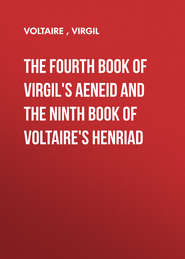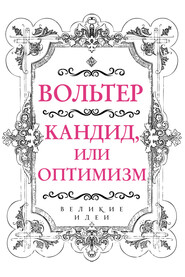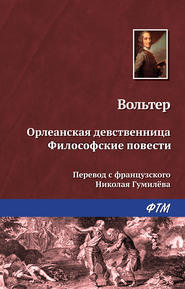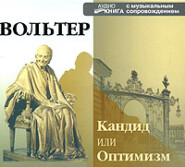По всем вопросам обращайтесь на: info@litportal.ru
(©) 2003-2024.
✖
A Philosophical Dictionary, Volume 10
Настройки чтения
Размер шрифта
Высота строк
Поля
A Philosophical Dictionary, Volume 10
Voltaire
François-Marie Arouet (AKA Voltaire)
A Philosophical Dictionary, Volume 10
STYLE
It is very strange that since the French people became literary they have had no book written in a good style, until the year 1654, when the "Provincial Letters" appeared; and why had no one written history in a suitable tone, previous to that of the "Conspiracy of Venice" of the Abbé St. Réal? How is it that Pellisson was the first who adopted the true Ciceronian style, in his memoir for the superintendent Fouquet?
Nothing is more difficult and more rare than a style altogether suitable to the subject in hand.
The style of the letters of Balzac would not be amiss for funeral orations; and we have some physical treatises in the style of the epic poem or the ode. It is proper that all things occupy their own places.
Affect not strange terms of expression, or new words, in a treatise on religion, like the Abbé Houteville; neither declaim in a physical treatise. Avoid pleasantry in the mathematics, and flourish and extravagant figures in a pleading. If a poor intoxicated woman dies of an apoplexy, you say that she is in the regions of death; they bury her, and you exclaim that her mortal remains are confided to the earth. If the bell tolls at her burial, it is her funeral knell ascending to the skies. In all this you think you imitate Cicero, and you only copy Master Littlejohn…
Without style, it is impossible that there can be a good work in any kind of eloquence or poetry. A profusion of words is the great vice of all our modern philosophers and anti-philosophers. The "Système de la Nature" is a great proof of this truth. It is very difficult to give just ideas of God and nature, and perhaps equally so to form a good style.
As the kind of execution to be employed by every artist depends upon the subject of which he treats – as the line of Poussin is not that of Teniers, nor the architecture of a temple that of a common house, nor music of a serious opera that of a comic one – so has each kind of writing its proper style, both in prose and verse. It is obvious that the style of history is not that of a funeral oration, and that the despatch of an ambassador ought not to be written like a sermon; that comedy is not to borrow the boldness of the ode, the pathetic expression of the tragedy, nor the metaphors and similes of the epic.
Every species has its different shades, which may, however, be reduced to two, the simple and the elevated. These two kinds, which embrace so many others, possess essential beauties in common, which beauties are accuracy of idea, adaptation, elegance, propriety of expression, and purity of language. Every piece of writing, whatever its nature, calls for these qualities; the difference consists in the employment of the corresponding tropes. Thus, a character in comedy will not utter sublime or philosophical ideas, a shepherd spout the notions of a conqueror, not a didactic epistle breathe forth passion; and none of these forms of composition ought to exhibit bold metaphor, pathetic exclamation, or vehement expression.
Between the simple and the sublime there are many shades, and it is the art of adjusting them which contributes to the perfection of eloquence and poetry. It is by this art that Virgil frequently exalts the eclogue. This verse: Ut vidi ut perii, ut me malus abstulit error! (Eclogue viii, v. 41) – I saw, I perished, yet indulged my pain! (Dryden) – would be as fine in the mouth of Dido as in that of a shepherd, because it is nature, true and elegant, and the sentiment belongs to any condition. But this:
Castaneasque nuces me quas Amaryllis amabat.
– Eclogue, ii, v. 52..
And pluck the chestnuts from the neighboring grove,
Such as my Amaryllis used to love.
– DRYDEN.
belongs not to an heroic personage, because the allusion is not such as would be made by a hero.
These two instances are examples of the cases in which the mingling of styles may be defended. Tragedy may occasionally stoop; it even ought to do so. Simplicity, according to the precept of Horace, often relieves grandeur. Et tragicus plerumque dolet sermone pedestri (Ars Poet., v. 95) – And oft the tragic language humbly flows (Francis).
These two verses in Titus, so natural and so tender:
Depuis cinq ans entiers chaque jour je la vois.
Et crois toujours la voir pour la première fois.
– BÉRÉNICE, acte ii, scene 1.
Each day, for five years, have I seen her face,
And each succeeding time appears the first.
would not be at all out of place in serious comedy; but the following verse of Antiochus: Dans l'orient desert quel devint mon ennui! (Id., acte i, scene 4) – The lonely east, how wearisome to me! – would not suit a lover in comedy; the figure of the "lonely east" is too elevated for the simplicity of the buskin. We have already remarked, that an author who writes on physics, in allusion to a writer on physics, called Hercules, adds that he is not able to resist a philosopher so powerful. Another who has written a small book, which he imagines to be physical and moral, against the utility of inoculation, says that if the smallpox be diffused artificially, death will be defrauded.
The above defect springs from a ridiculous affectation. There is another which is the result of negligence, which is that of mingling with the simple and noble style required by history, popular phrases and low expressions, which are inimical to good taste. We often read in Mézeray, and even in Daniel, who, having written so long after him, ought to be more correct, that "a general pursued at the heels of the enemy, followed his track, and utterly basted him" —à plate couture. We read nothing of this kind in Livy, Tacitus, Guicciardini, or Clarendon.
Let us observe, that an author accustomed to this kind of style can seldom change it with his subject. In his operas, La Fontaine composed in the style of his fables; and Benserade, in his translation of Ovid's "Metamorphoses," exhibited the same kind of pleasantry which rendered his madrigals successful. Perfection consists in knowing how to adapt our style to the various subjects of which we treat; but who is altogether the master of his habits, and able to direct his genius at pleasure?
VARIOUS STYLES DISTINGUISHED
The Feeble.
Weakness of the heart is not that of the mind, nor weakness of the soul that of the heart. A feeble soul is without resource in action, and abandons itself to those who govern it. The heart which is weak or feeble is easily softened, changes its inclinations with facility, resists not the seduction or the ascendency required, and may subsist with a strong mind; for we may think strongly and act weakly. The weak mind receives impressions without resistance, embraces opinions without examination, is alarmed without cause, and tends naturally to superstition.
A work may be feeble either in its matter or its style; by the thoughts, when too common, or when, being correct, they are not sufficiently profound; and by the style, when it is destitute of images, or turns of expression, and of figures which rouse attention. Compared with those of Bossuet, the funeral orations of Mascaron are weak, and his style is lifeless.
Every speech is feeble when it is not relieved by ingenious turns, and by energetic expressions; but a pleader is weak, when, with all the aid of eloquence, and all the earnestness of action, he fails in ratiocination. No philosophical work is feeble, notwithstanding the deficiency of its style, if the reasoning be correct and profound. A tragedy is weak, although the style be otherwise, when the interest is not sustained. The best-written comedy is feeble if it fails in that which the Latins call the "vis comica," which is the defect pointed out by Cæsar in Terence: "Lenibus atque utinam scriptis adjuncta foret vis comica!"
This is above all the sin of the weeping or sentimental comedy (larmoyante). Feeble verses are not those which sin against rules, but against genius; which in their mechanism are without variety, without choice expression, or felicitous inversions; and which retain in poetry the simplicity and homeliness of prose. The distinction cannot be better comprehended than by a reference to the similar passages of Racine and Campistron, his imitator.
Flowery Style.
"Flowery," that which is in blossom; a tree in blossom, a rose-bush in blossom: people do not say, flowers which blossom. Of flowery bloom, the carnation seems a mixture of white and rose-color. We sometimes say a flowery mind, to signify a person possessing a lighter species of literature, and whose imagination is lively.
A flowery discourse is more replete with agreeable than with strong thoughts, with images more sparkling than sublime, and terms more curious than forcible. This metaphor is correctly taken from flowers, which are showy without strength or stability.
The flowery style is not unsuitable to public speeches or addresses which amount only to compliment. The lighter beauties are in their place when there is nothing more solid to say; but the flowery style should be banished from a pleading, a sermon, or a didactic work.
While banishing the flowery style, we are not to reject the soft and lively images which enter naturally into the subject; a few flowers are even admissible; but the flowery style cannot be made suitable to a serious subject.
This style belongs to productions of mere amusement; to idyls, eclogues, and descriptions of the seasons, or of gardens. It may gracefully occupy a portion of the most sublime ode, provided it be duly relieved by stanzas of more masculine beauty. It has little to do with comedy, which, as it ought to possess a resemblance to common life, requires more of the style of ordinary conversation. It is still less admissible in tragedy, which is the province of strong passions and momentous interests; and when occasionally employed in tragedy or comedy, it is in certain descriptions in which the heart takes no part, and which amuse the imagination without moving or occupying the soul.
The flowery style detracts from the interest of tragedy, and weakens ridicule in comedy. It is in its place in the French opera, which rather flourishes on the passions than exhibits them. The flowery is not to be confounded with the easy style, which rejects this class of embellishment.
Coldness of Style.
It is said that a piece of poetry, of eloquence, of music, and even of painting, is cold, when we look for an animated expression in it, which we find not. Other arts are not so susceptible of this defect; for instance, architecture, geometry, logic, metaphysics, all the principal merit of which is correctness, cannot properly be called warm or cold. The picture of the family of Darius, by Mignard, is very cold in comparison with that of Lebrun, because we do not discover in the personages of Mignard the same affliction which Lebrun has so animatedly expressed in the attitudes and countenances of the Persian princesses. Even a statue may be cold; we ought to perceive fear and horror in the features of an Andromeda, the effect of a writhing of the muscles; and anger mingled with courageous boldness in the attitude and on the brow of Hercules, who suspends and strangles Antæus.
In poetry and eloquence the great movements of the soul become cold, when they are expressed in common terms, and are unaided by imagination. It is this latter which makes love so animated in Racine, and so languid in his imitator, Campistron.
The sentiments which escape from a soul which seeks concealment, on the contrary, require the most simple expression. Nothing is more animated than those verses in "The Cid": "Go; I hate thee not – thou knowest it; I cannot." This feeling would become cold, if conveyed in studied phrases.
For this reason, nothing is so cold as the timid style. A hero in a poem says, that he has encountered a tempest, and that he has beheld his friend perish in the storm. He touches and affects, if he speaks with profound grief of his loss – that is, if he is more occupied with his friend than with all the rest; but he becomes cold, and ceases to affect us, if he amuses us with a description of the tempest; if he speaks of the source of "the fire which was boiling up the waters, and of the thunder which roars and which redoubles the furrows of the earth and of the waves." Coldness of style, therefore, often arises from a sterility of ideas; often from a deficiency in the power of governing them; frequently from a too common diction, and sometimes from one that is too far-fetched.
The author who is cold only in consequence of being animated out of time and place, may correct this defect of a too fruitful imagination; but he who is cold from a deficiency of soul is incapable of self-correction. We may allay a fire which is too intense, but cannot acquire heat if we have none.
On Corruption of Style.
A general complaint is made, that eloquence is corrupted, although we have models of almost all kinds. One of the greatest defects of the day, which contributes most to this defect, is the mixture of style. It appears to me, that we authors do not sufficiently imitate the painters, who never introduce the attitudes of Calot with the figures of Raphael. I perceive in histories, otherwise tolerably well written, and in good doctrinal works, the familiar style of conversation. Some one has formerly said, that we must write as we speak; the sense of which law is, that we should write naturally. We tolerate irregularity in a letter, freedom as to style, incorrectness, and bold pleasantries, because letters, written spontaneously, without particular object or act, are negligent conversations; but when we speak or treat of a subject formally, some attention is due to decorum; and to whom ought we to pay more respect than to the public?
Is it allowable to write in a mathematical work, that "a geometrician who would pay his devotions, ought to ascend to heaven in a right line; that evanescent quantities turn up their noses at the earth for having too much elevated them; that a seed sown in the ground takes an opportunity to release and amuse itself; that if Saturn should perish, it would be his fifth and not his first satellite that would take his place, because kings always keep their heirs at a distance; that there is no void except in the purse of a ruined man; that when Hercules treats of physics, no one is able to resist a philosopher of his degree of power?" etc.
Some very valuable works are infected with this fault. The source of a defect so common seems to me to be the accusation of pedantry, so long and so justly made against authors. "In vitium ducit culpæ fuga." It is frequently said, that we ought to write in the style of good company; that the most serious authors are becoming agreeable: that is to say, in order to exhibit the manners of good company to their readers, they deliver themselves in the style of very bad company.
Authors have sought to speak of science as Voiture spoke to Mademoiselle Paulet of gallantry, without dreaming that Voiture by no means exhibits a correct taste in the species of composition in which he was esteemed excellent; for he often takes the false for the refined, and the affected for the natural. Pleasantry is never good on serious points, because it always regards subjects in that point of view in which it is not the purpose to consider them. It almost always turns upon false relations and equivoque, whence jokers by profession usually possess minds as incorrect as they are superficial.
It appears to me, that it is as improper to mingle styles in poetry as in prose. The macaroni style has for some time past injured poetry by this medley of mean and of elevated, of ancient and of modern expression. In certain moral pieces it is not musical to hear the whistle of Rabelais in the midst of sounds from the flute of Horace – a practice which we should leave to inferior minds, and attend to the lessons of good sense and of Boileau. The following is a singular instance of style, in a speech delivered at Versailles in 1745:
Voltaire
François-Marie Arouet (AKA Voltaire)
A Philosophical Dictionary, Volume 10
STYLE
It is very strange that since the French people became literary they have had no book written in a good style, until the year 1654, when the "Provincial Letters" appeared; and why had no one written history in a suitable tone, previous to that of the "Conspiracy of Venice" of the Abbé St. Réal? How is it that Pellisson was the first who adopted the true Ciceronian style, in his memoir for the superintendent Fouquet?
Nothing is more difficult and more rare than a style altogether suitable to the subject in hand.
The style of the letters of Balzac would not be amiss for funeral orations; and we have some physical treatises in the style of the epic poem or the ode. It is proper that all things occupy their own places.
Affect not strange terms of expression, or new words, in a treatise on religion, like the Abbé Houteville; neither declaim in a physical treatise. Avoid pleasantry in the mathematics, and flourish and extravagant figures in a pleading. If a poor intoxicated woman dies of an apoplexy, you say that she is in the regions of death; they bury her, and you exclaim that her mortal remains are confided to the earth. If the bell tolls at her burial, it is her funeral knell ascending to the skies. In all this you think you imitate Cicero, and you only copy Master Littlejohn…
Without style, it is impossible that there can be a good work in any kind of eloquence or poetry. A profusion of words is the great vice of all our modern philosophers and anti-philosophers. The "Système de la Nature" is a great proof of this truth. It is very difficult to give just ideas of God and nature, and perhaps equally so to form a good style.
As the kind of execution to be employed by every artist depends upon the subject of which he treats – as the line of Poussin is not that of Teniers, nor the architecture of a temple that of a common house, nor music of a serious opera that of a comic one – so has each kind of writing its proper style, both in prose and verse. It is obvious that the style of history is not that of a funeral oration, and that the despatch of an ambassador ought not to be written like a sermon; that comedy is not to borrow the boldness of the ode, the pathetic expression of the tragedy, nor the metaphors and similes of the epic.
Every species has its different shades, which may, however, be reduced to two, the simple and the elevated. These two kinds, which embrace so many others, possess essential beauties in common, which beauties are accuracy of idea, adaptation, elegance, propriety of expression, and purity of language. Every piece of writing, whatever its nature, calls for these qualities; the difference consists in the employment of the corresponding tropes. Thus, a character in comedy will not utter sublime or philosophical ideas, a shepherd spout the notions of a conqueror, not a didactic epistle breathe forth passion; and none of these forms of composition ought to exhibit bold metaphor, pathetic exclamation, or vehement expression.
Between the simple and the sublime there are many shades, and it is the art of adjusting them which contributes to the perfection of eloquence and poetry. It is by this art that Virgil frequently exalts the eclogue. This verse: Ut vidi ut perii, ut me malus abstulit error! (Eclogue viii, v. 41) – I saw, I perished, yet indulged my pain! (Dryden) – would be as fine in the mouth of Dido as in that of a shepherd, because it is nature, true and elegant, and the sentiment belongs to any condition. But this:
Castaneasque nuces me quas Amaryllis amabat.
– Eclogue, ii, v. 52..
And pluck the chestnuts from the neighboring grove,
Such as my Amaryllis used to love.
– DRYDEN.
belongs not to an heroic personage, because the allusion is not such as would be made by a hero.
These two instances are examples of the cases in which the mingling of styles may be defended. Tragedy may occasionally stoop; it even ought to do so. Simplicity, according to the precept of Horace, often relieves grandeur. Et tragicus plerumque dolet sermone pedestri (Ars Poet., v. 95) – And oft the tragic language humbly flows (Francis).
These two verses in Titus, so natural and so tender:
Depuis cinq ans entiers chaque jour je la vois.
Et crois toujours la voir pour la première fois.
– BÉRÉNICE, acte ii, scene 1.
Each day, for five years, have I seen her face,
And each succeeding time appears the first.
would not be at all out of place in serious comedy; but the following verse of Antiochus: Dans l'orient desert quel devint mon ennui! (Id., acte i, scene 4) – The lonely east, how wearisome to me! – would not suit a lover in comedy; the figure of the "lonely east" is too elevated for the simplicity of the buskin. We have already remarked, that an author who writes on physics, in allusion to a writer on physics, called Hercules, adds that he is not able to resist a philosopher so powerful. Another who has written a small book, which he imagines to be physical and moral, against the utility of inoculation, says that if the smallpox be diffused artificially, death will be defrauded.
The above defect springs from a ridiculous affectation. There is another which is the result of negligence, which is that of mingling with the simple and noble style required by history, popular phrases and low expressions, which are inimical to good taste. We often read in Mézeray, and even in Daniel, who, having written so long after him, ought to be more correct, that "a general pursued at the heels of the enemy, followed his track, and utterly basted him" —à plate couture. We read nothing of this kind in Livy, Tacitus, Guicciardini, or Clarendon.
Let us observe, that an author accustomed to this kind of style can seldom change it with his subject. In his operas, La Fontaine composed in the style of his fables; and Benserade, in his translation of Ovid's "Metamorphoses," exhibited the same kind of pleasantry which rendered his madrigals successful. Perfection consists in knowing how to adapt our style to the various subjects of which we treat; but who is altogether the master of his habits, and able to direct his genius at pleasure?
VARIOUS STYLES DISTINGUISHED
The Feeble.
Weakness of the heart is not that of the mind, nor weakness of the soul that of the heart. A feeble soul is without resource in action, and abandons itself to those who govern it. The heart which is weak or feeble is easily softened, changes its inclinations with facility, resists not the seduction or the ascendency required, and may subsist with a strong mind; for we may think strongly and act weakly. The weak mind receives impressions without resistance, embraces opinions without examination, is alarmed without cause, and tends naturally to superstition.
A work may be feeble either in its matter or its style; by the thoughts, when too common, or when, being correct, they are not sufficiently profound; and by the style, when it is destitute of images, or turns of expression, and of figures which rouse attention. Compared with those of Bossuet, the funeral orations of Mascaron are weak, and his style is lifeless.
Every speech is feeble when it is not relieved by ingenious turns, and by energetic expressions; but a pleader is weak, when, with all the aid of eloquence, and all the earnestness of action, he fails in ratiocination. No philosophical work is feeble, notwithstanding the deficiency of its style, if the reasoning be correct and profound. A tragedy is weak, although the style be otherwise, when the interest is not sustained. The best-written comedy is feeble if it fails in that which the Latins call the "vis comica," which is the defect pointed out by Cæsar in Terence: "Lenibus atque utinam scriptis adjuncta foret vis comica!"
This is above all the sin of the weeping or sentimental comedy (larmoyante). Feeble verses are not those which sin against rules, but against genius; which in their mechanism are without variety, without choice expression, or felicitous inversions; and which retain in poetry the simplicity and homeliness of prose. The distinction cannot be better comprehended than by a reference to the similar passages of Racine and Campistron, his imitator.
Flowery Style.
"Flowery," that which is in blossom; a tree in blossom, a rose-bush in blossom: people do not say, flowers which blossom. Of flowery bloom, the carnation seems a mixture of white and rose-color. We sometimes say a flowery mind, to signify a person possessing a lighter species of literature, and whose imagination is lively.
A flowery discourse is more replete with agreeable than with strong thoughts, with images more sparkling than sublime, and terms more curious than forcible. This metaphor is correctly taken from flowers, which are showy without strength or stability.
The flowery style is not unsuitable to public speeches or addresses which amount only to compliment. The lighter beauties are in their place when there is nothing more solid to say; but the flowery style should be banished from a pleading, a sermon, or a didactic work.
While banishing the flowery style, we are not to reject the soft and lively images which enter naturally into the subject; a few flowers are even admissible; but the flowery style cannot be made suitable to a serious subject.
This style belongs to productions of mere amusement; to idyls, eclogues, and descriptions of the seasons, or of gardens. It may gracefully occupy a portion of the most sublime ode, provided it be duly relieved by stanzas of more masculine beauty. It has little to do with comedy, which, as it ought to possess a resemblance to common life, requires more of the style of ordinary conversation. It is still less admissible in tragedy, which is the province of strong passions and momentous interests; and when occasionally employed in tragedy or comedy, it is in certain descriptions in which the heart takes no part, and which amuse the imagination without moving or occupying the soul.
The flowery style detracts from the interest of tragedy, and weakens ridicule in comedy. It is in its place in the French opera, which rather flourishes on the passions than exhibits them. The flowery is not to be confounded with the easy style, which rejects this class of embellishment.
Coldness of Style.
It is said that a piece of poetry, of eloquence, of music, and even of painting, is cold, when we look for an animated expression in it, which we find not. Other arts are not so susceptible of this defect; for instance, architecture, geometry, logic, metaphysics, all the principal merit of which is correctness, cannot properly be called warm or cold. The picture of the family of Darius, by Mignard, is very cold in comparison with that of Lebrun, because we do not discover in the personages of Mignard the same affliction which Lebrun has so animatedly expressed in the attitudes and countenances of the Persian princesses. Even a statue may be cold; we ought to perceive fear and horror in the features of an Andromeda, the effect of a writhing of the muscles; and anger mingled with courageous boldness in the attitude and on the brow of Hercules, who suspends and strangles Antæus.
In poetry and eloquence the great movements of the soul become cold, when they are expressed in common terms, and are unaided by imagination. It is this latter which makes love so animated in Racine, and so languid in his imitator, Campistron.
The sentiments which escape from a soul which seeks concealment, on the contrary, require the most simple expression. Nothing is more animated than those verses in "The Cid": "Go; I hate thee not – thou knowest it; I cannot." This feeling would become cold, if conveyed in studied phrases.
For this reason, nothing is so cold as the timid style. A hero in a poem says, that he has encountered a tempest, and that he has beheld his friend perish in the storm. He touches and affects, if he speaks with profound grief of his loss – that is, if he is more occupied with his friend than with all the rest; but he becomes cold, and ceases to affect us, if he amuses us with a description of the tempest; if he speaks of the source of "the fire which was boiling up the waters, and of the thunder which roars and which redoubles the furrows of the earth and of the waves." Coldness of style, therefore, often arises from a sterility of ideas; often from a deficiency in the power of governing them; frequently from a too common diction, and sometimes from one that is too far-fetched.
The author who is cold only in consequence of being animated out of time and place, may correct this defect of a too fruitful imagination; but he who is cold from a deficiency of soul is incapable of self-correction. We may allay a fire which is too intense, but cannot acquire heat if we have none.
On Corruption of Style.
A general complaint is made, that eloquence is corrupted, although we have models of almost all kinds. One of the greatest defects of the day, which contributes most to this defect, is the mixture of style. It appears to me, that we authors do not sufficiently imitate the painters, who never introduce the attitudes of Calot with the figures of Raphael. I perceive in histories, otherwise tolerably well written, and in good doctrinal works, the familiar style of conversation. Some one has formerly said, that we must write as we speak; the sense of which law is, that we should write naturally. We tolerate irregularity in a letter, freedom as to style, incorrectness, and bold pleasantries, because letters, written spontaneously, without particular object or act, are negligent conversations; but when we speak or treat of a subject formally, some attention is due to decorum; and to whom ought we to pay more respect than to the public?
Is it allowable to write in a mathematical work, that "a geometrician who would pay his devotions, ought to ascend to heaven in a right line; that evanescent quantities turn up their noses at the earth for having too much elevated them; that a seed sown in the ground takes an opportunity to release and amuse itself; that if Saturn should perish, it would be his fifth and not his first satellite that would take his place, because kings always keep their heirs at a distance; that there is no void except in the purse of a ruined man; that when Hercules treats of physics, no one is able to resist a philosopher of his degree of power?" etc.
Some very valuable works are infected with this fault. The source of a defect so common seems to me to be the accusation of pedantry, so long and so justly made against authors. "In vitium ducit culpæ fuga." It is frequently said, that we ought to write in the style of good company; that the most serious authors are becoming agreeable: that is to say, in order to exhibit the manners of good company to their readers, they deliver themselves in the style of very bad company.
Authors have sought to speak of science as Voiture spoke to Mademoiselle Paulet of gallantry, without dreaming that Voiture by no means exhibits a correct taste in the species of composition in which he was esteemed excellent; for he often takes the false for the refined, and the affected for the natural. Pleasantry is never good on serious points, because it always regards subjects in that point of view in which it is not the purpose to consider them. It almost always turns upon false relations and equivoque, whence jokers by profession usually possess minds as incorrect as they are superficial.
It appears to me, that it is as improper to mingle styles in poetry as in prose. The macaroni style has for some time past injured poetry by this medley of mean and of elevated, of ancient and of modern expression. In certain moral pieces it is not musical to hear the whistle of Rabelais in the midst of sounds from the flute of Horace – a practice which we should leave to inferior minds, and attend to the lessons of good sense and of Boileau. The following is a singular instance of style, in a speech delivered at Versailles in 1745:















